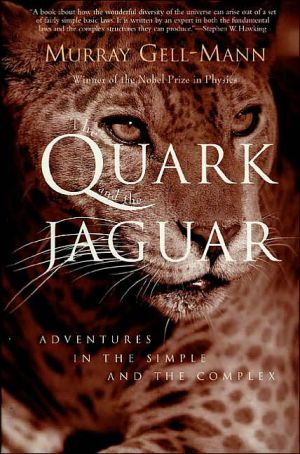

 |

|

The average rating for Quark and the Jaguar: Adventures in the Simple and the Complex based on 2 reviews is 3.5 stars.
Review # 1 was written on 2013-01-30 00:00:00 Gregory Bennett Gregory BennettPeople make positive statements more often than negative ones and want to clearly distinguish between the two; therefore, it makes sense for a language to have a "not" morpheme. A language usually has 10 to 100 phonemes; even if there are some languages that go outside these bounds, no human language has a million phonemes: no one could ever learn it. Latin had three grammatical genders; most Latin-derived Romance languages have two, with the neuter merging into the masculine, and Romanian retains all three, but no Romance language has developed twenty-some gender-number combinations like Bantu languages have, including the plant gender and the abstract nouns gender. Living Indo-European languages are much more grammatically diverse than Romance languages, but they still retain some vestiges of Proto-Indo-European grammar; none of them are like Chinese grammatically. It is possible that likewise, all human languages have shared features that remain from the last shared human languages. If we look at linguistic universal and near-universals, some of them will be adaptive, some will follow from human biology, and some will be "frozen accidents". The same will be true not just for language but for any complex adaptive system such as life. That life is built of carbon and not silicon probably follows from the chemistry of these elements; that all life uses a particular genetic code with extremely minor variations is probably a frozen accident; that most mutations are either neutral or only slightly detrimental to the organism, and may be beneficial in changed circumstances is probably adaptive. Now, how do you distinguish between these cases? Gell-Mann is an elementary particle physicist who did pioneering work in the theory of strong and weak interaction, most famously coining the term "quark", and received the 1969 physics Nobel prize. While traveling in South America, he saw a jaguarundi, which is a small wild cat, and was struck by how different it is from the quark. The jaguarundi is an animal that consists of organs, which consist of tissues, which consist of cells, which consist of organelles, which consist of molecules, which consist of atoms, which consist of electrons and nuclei, which consist of nucleons, which consist of quarks. Modulo a few quantum numbers, all quarks are the same; each jaguarundi is a different individual. The behavior of the quark is predictable as much as anything is predictable in quantum physics; that of the jaguarundi is unpredictable. The jaguarundi adapts to its environment; the quark doesn't. Somehow when you travel up the ladder of levels of abstraction, these properties emerge. In order to tackle this mystery, Gell-Mann tries to run through all of science in less than 400 pages, mentioning things like Bell's inequalities from quantum physics, the ecology of different desert biomes, grammatical universals and near-universals from linguistics, spontaneous symmetry breaking from quantum field theory, and more. I don't know who this book is written for. In order to understand the physics part, you need a Ph.D. in high-energy physics, but then you'll know this material already; I doubt that an average biophysicist knows what Gell-Mann is talking about when he says, "Quantum flavor dynamics and quantum chromodynamics [...] belong to the same class of theories - so-called gauge theories of Yang-Mills theories (as generalized by Shelly Glashow and me long ago.)" and does not give any further explanations. A reader who is not a physicist certainly won't know what Gell-Mann is talking about. This book mentions in passing Joseph Greenberg's theory of linguistic universals, and says that some universals may be adaptive, some are basic consequences of human biology, and some may be "frozen accidents" remaining from the first human language that no generation of speakers could ever alter, but no examples are given. So this is basically an ego trip in book form. We already know that a Physics Nobel laureate must be smart, and know a lot; why write a book about it? |
Review # 2 was written on 2007-08-14 00:00:00 Leticia Perez Leticia PerezGeared towards a general audience'albeit one with a certain intellectual tenacity'this book does two things very well: it reconciles quantum physics with our everyday world, removing much of the unecessary mystery surrounding the subject, and it puts the reader in touch with the penumbra of mystery that surrounds even the most sober reason. Not only did the nobel-prize winning author take the time to make his science accessible to the non-specialist, he anticipated counterarguments to his presentation (ones that often came to my mind while reading the text) and explained why they didn't work. If you don't like it when people are smarter than you then don't read this book. This book was a gift from my wife. Thanks Dorian! |
CAN'T FIND WHAT YOU'RE LOOKING FOR? CLICK HERE!!!